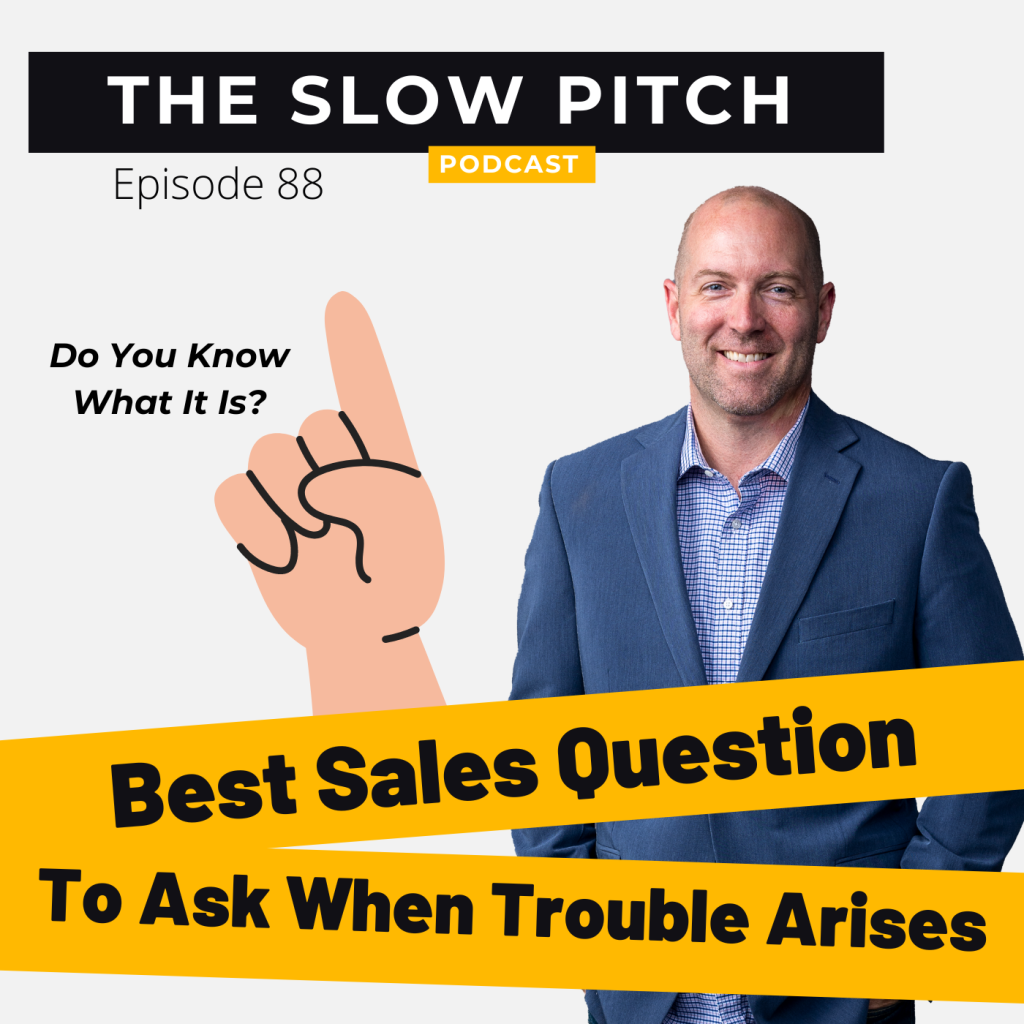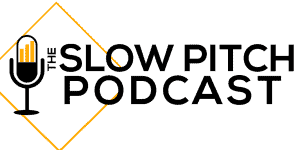This Is The Best Sales Question To Ask (1 Question)


Notes
The Best Sales Questions To Ask To Help You Close More Sales
Discover the best sales question to ask that can transform your approach and drive unparalleled success. In this episode, we delve into the effectiveness of the ‘What Happens If…’ inquiry and how it can revolutionize your sales strategy. Join us as we explore real-world examples, practical tips, and expert insights to help you harness the full potential of this game-changing question.
In sales, mastering the art of asking the right questions is key to success. As sales professionals, we’re constantly seeking ways to engage prospects, uncover their needs, and guide them towards a favorable decision. Amidst a plethora of sales tactics and strategies, one question stands out as particularly powerful: the ‘What Happens If…’ inquiry.
In this episode, we explore the effectiveness asking ‘What Happens If…’ and its transformative impact on your process. While traditional sales approaches often focus on pitching products or services, the ‘What Happens If…’ question takes a different approach by inviting prospects to consider the potential consequences of their decisions or needs. This also separates the buyers from the time-wasters.
But what makes this so effective? At its core, the ‘What Happens If…’ inquiry serves as a catalyst for meaningful conversations, allowing sales professionals to dive deeper into the potential buyer’s motivations, concerns, and objectives. By simply encouraging prospects to think about what they’re asking so that salespeople can uncover hidden objections, address misconceptions, and ultimately guide the conversation towards a positive outcome. This is one tool in your tool bag that you should be using every time you receive a difficult constraint.
What If I Can’t?
Throughout this episode, Rob explores a few scenarios in which the ‘What Happens If…’ question can be applied, from clarifying unrealistic expectations to overcoming objections and closing deals. Drawing from real-world examples and expert insights, we’ll provide practical tips and strategies for seamlessly integrating this into your sales repertoire.
But the benefits of the ‘What Happens If…’ inquiry extend beyond individual sales interactions. By fostering trust, transparency, and empathy, sales professionals can build lasting relationships with prospects, paving the way for repeat business and referrals. In an era where authenticity is paramount, this customer-centric approach sets the stage for long-term success and differentiation in a competitive marketplace.
As we conclude this engaging episode, we leave you with a challenge: embrace the power of asking ‘What Happens If…’ during your meetings or calls. Whether you’re a seasoned veteran or just starting out in the field, incorporating this simple yet effective tool can make a profound difference in your success. So, if you’re ready to elevate your sales game and unlock new opportunities, tune in now and discover the best sales question to ask.
Join us as we unravel the secrets of sales excellence and empower you to achieve unprecedented results. Don’t miss out on this invaluable opportunity to revolutionize your approach and take your business to new heights.
Related Articles or Episodes:
Stopping Buyers Remorse Before It Starts (3 Tips)
Be An Excellent Salesperson – 3 Simple Changes
Podcast Recorded on Squadcast.fm
NOTE: Some links may be affiliate links, which means we get paid a commission when you purchase, but it the cost remains the same for you.
Music: "Clydesdale Funk" by Cast of Characters, written by: Dustin Ransom.
The Episode
Rob 00:08
Welcome back, everybody to The Slow Pitch. Today, I’m going to give you a phrase that if you use it, you may end up closing a bunch more business.
V/O 00:19
This is The Slow Pitch Podcast.
Rob 00:21
Alright… Have you ever had a possible buyer make a comment that sounds like they are bout ready to buy, but like, you’re not really sure. So for example, what if they say this, this question something like this, we need your service by May 1. And today is, let’s say the 15th. So you have now two weeks to get the work done.
00:41 They haven’t even signed the contract. What do you say? Do you say, Yeah, sure, we can do that. That’s what a lot of people do. That’s the wrong thing to do. You know what you need to say, when somebody asks you those types of questions or say something like that, what you need to ask is, what happens if I can’t do that for you? What happens if I can’t hit that date?
01:01 Their answer will likely be an eye opening answer or an ear opening answer, depending on how you are auditory or visual. Here’s what I mean by that half the time they they asked me that question, or they say something like that. And their response back to my question that when I asked them, What happens if I can’t do that half the time that comes back with I was just curious, there was no reason that they needed it.
01:20. They didn’t really need it that date, it was an arbitrary timeline that they just decided they wanted to throw out there. I don’t know if it’s meant to trick you. I don’t know if it’s meant to make you feel like there’s there’s gonna be a sale? I don’t know. But when I do that, when I say what happens if I can’t do that, what happens if we’re not able to hit that deadline?
01:36 What happens is as they answer it they realize, number one, how ludicrous it might be right? Or they might realize I really don’t need it. It’s not that didn’t remind us of how big of a deal because when they answer back, they say, Oh, I’m just curious. And then I have to ask one another question. Well, how come you’re curious about that?
01:53 What’s going on on the first and when you start digging into it, you find out maybe there was a deadline, maybe there’s something coming up, maybe there is something that they need to have it done by you’ll now know, you’re in a time crunch. And so if they have what we used to what we know, we’ve talked about this before, on the on the The Slow Pitch is the bleeding neck, if they have a bleeding neck, that means they need to buy, they’re gonna buy from somebody, and you want to make it you right?
02:15 So if you want to put up with that timeline, right. But if you’re going to go through that, then you need to know some parameters, what that means what that’s going to do, you know, one of these, you’re going to want to know is, hey, if I am going to make this deadline of the first and today’s the 15th, you and you made a decision to get started. So how are we doing that?
02:33 And they’ll start telling you some more information than to what happens if they ask you, “Hey, we need this number to be at x… So instead of $10,000, it needs to be at $6,000?” Somewhere in that conversation. They say something like that? Well, you can ask same question. You can say, well, what happens if I can’t do it for $6,000? And of course, anytime that I’m saying this, you have to keep in mind that I’m gonna say this in a very nurturing way.
02:55 So it’s going to be it’s going to come across in such a way that’s nice. It’s kind. It’s like, yeah, I want to help you. But really, what happens if I can’t do that? Like, if I lower my voice, I see things a little nicer. And I find that the answer that I get back, typically, it’s usually more than 50% that they actually back off from that. But by asking the question, I find out whether or not that’s a real thing or not. It also works when they say,
03:21 Hey, we want to create this, whatever it is, or do this project this way, and you have a different way of doing things. So what happens if your process is you’re going to do step 123? And they’re like, No, we’re going to skip right to four, we’re going to start there. Because we don’t need to do all that because you know, they know better than you sometimes, right?
03:39 So when when that happens again asking, “What happens If I can’t do that? What happens if that’s not our process? Is that okay with you,” It’s one of those, you’re going to have to ask for some clarifications?
V/O 03:53
Do you a question about sales call or text it at (608) 708-SLOW. That’s (608) 708-7569. Or you can email them to Questions@TheSlowPitch.com. Now, back to the show.
Rob 04:13
Another situation that you might be able to ask that question back to them is when they ask you, “Hey, we need to start on a day that’s in the future… plenty of time out in the future… but you have a conflict already scheduled on that day. Again, ask back, “What happens if I can’t start on that day?”
04:29 I’ve been in scenarios where people have a specific thing where only certain people are available, the most important people, they’re going to be available on this day. And we’re to the point where we can make a decision on this. We think we’re going to sign the contract. But we need you to do this meeting with these people that are going to be in the area on this particular day. Can you do that? I can answer yes.
04:46 Or I can answer no, that may not get me the sale. I need to know why they’re asking me that question. Right. So I have to ask the question number one, what happens if I can’t? Because I may not be able to? But second, why that particular day and what is happened? Why is that so important to you? And by asking those questions, I’m gonna find out more information while they’re all in town.
05:05 So, so often, there’s only so much time that I get to work with these people that because they don’t come here very often, whatever that might be. So the other question, what can we do zoom? Can we do other things? There are other questions that you might be able to ask back so that you can get a better feel for what’s going on with that, I find that the question What happens if and you fill in whatever they’re requesting, whatever they seem to think that they need? When you ask that question, most of the time, it’s a garbage question.
05:34 And by asking them back, what happens if you’re basically eliminating that question? Because they will tell themselves now it’s not that important, or I was just curious, or I’m not really sure. I just thought that might be a good day for us to do that, whatever that might be.
05:49 It’s usually not a deal breaker. And when you find it is a deal breaker, when they asked you that question and use they give you the answer, then you know, it’s not going to go any further, you’re not going to get that sale. Don’t waste any more time on it. Right? So then you say, Boy, it sounds like I’m not gonna be to help you, then I wish I could, but I wish you luck. Let me know if I can help you with anything or I can connect you to somebody else.
06:10 I’m happy to do that. But I just can’t I can’t do anything for you. Ah, that sounds like like that’s, that’s where it ends up going. Right. So I hope this helps, because it’ll, it’ll weed out a lot of problems. That simple. One little question will make a difference in whether or not you get more sales, or decide to walk away from a sale, because if they’re demanding, they’re going to do that in the in the project. too.
06:31 When you start working together, they’re probably going to be that way to, they’re going to start demanding, and you can use it in the future to when you’re when you’re not in a sales situation, you’re actually doing the work. You could actually say back to them when you’re in the middle of a project. We need to do this.
06:46 Well what happens if I can’t they’ll tell you well, we’re going to have this problem, this problem, this problem, it’s going to, it’s going to roll into a five other problems. Or well, I was just curious, because we needed enough time to do this. Well, guess what your time constraints. They’re false, and they shouldn’t affect my time constraints. If I know that I need this much time, I’m telling you what it’s going to take.
07:04 Why would I want to go faster and make my outcome poor quality? And so I would need to ask that questions and see what I get for an answer. If you find this to be helpful, hit that share button. That’s the number one way you can help us with this podcast is sharing episodes with somebody that need this type of advice. If they have a specific problem, or they’ve come up to you and said I don’t know how to deal with this right? Have you ever had this problem? share this episode with them. I truly appreciate it.
V/O 07:32
Thank you for listening to The Slow Pitch. Do you have a question about sales? Call or text your question at (608) 708-SLOW. That’s (608) 788-7569. Or you can email them to Questions@TheSlowPitch.com. Slow Down and Close More.
Rob 08:22
Thanks as always, for listening today. If you’d like this podcast, please subscribe and leave us a review. We really appreciate it. Follow us on Twitter, Instagram and Facebook at The Slow Pitch. We were mixed today as always by Johnny Polakis. And we were produced by High Gravity Studios. Music credits and other notes are in the show notes section on TheSlowPitch.com And we’ll be back with another episode soon.








